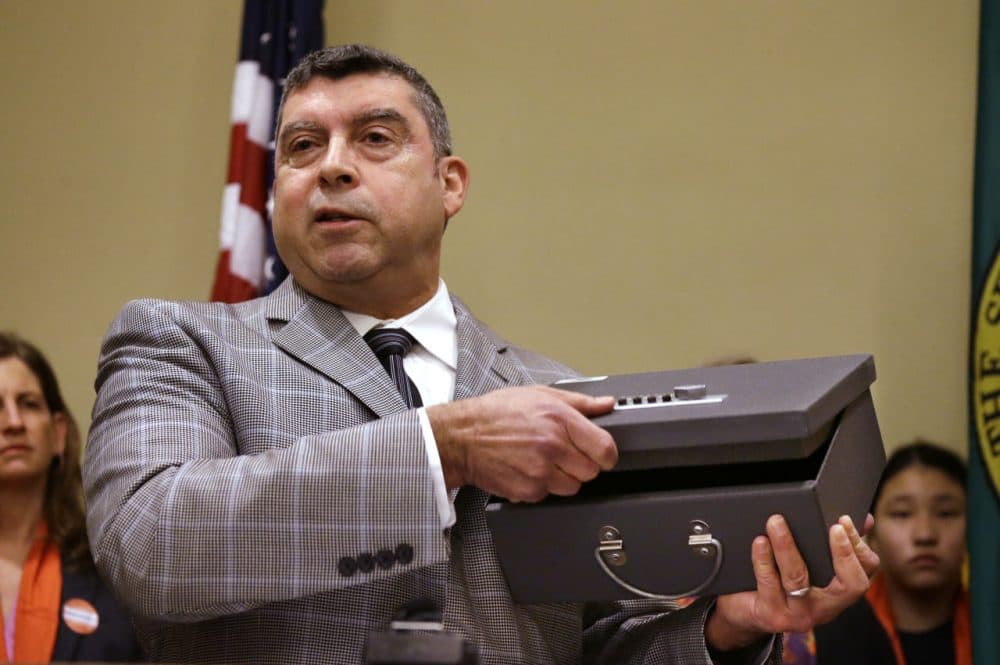Advertisement
Opinion: Pediatrician Asks, Why Can't I Talk To You About Guns In The Home?

Here's a conversation I was in on recently between a pediatric intern and the parents of a healthy, 1-day-old baby. It occurred in the Yale-New Haven Hospital well baby nursery.
“Your daughter’s physical exam is perfect," the intern said. "She’s eating well, peeing and pooping well. I want to talk to you a little about how to help you keep her safe and healthy."
Next came a standard discussion about the baby's sleeping position and whether she's got a car seat. Then, the next question:
"Do you have any guns in the home?”
Suddenly, the genial tone changed.
“I don’t think you should ask that question,” said the child's father.
“Should I take that as a 'yes'?" the intern pressed.
“I just don’t think you should ask.”
“Sir, we ask because we want to make sure that your baby is as safe as she can be, making sure you keep any guns locked up and away from her.”
“It’s none of your business.”
What started out as a lovely interaction between two new parents and the pediatric intern, with me observing, suddenly turned into the reprimands of an angry father. No matter how the pediatric resident and I tried to explain that we were asking for the safety of his newborn daughter, he persisted in telling us it was none of our business and not relevant for the child's health. The mother sat silent in her hospital bed.
This really shouldn't be controversial.
Since 1992, the American Academy of Pediatrics has encouraged primary care providers to discuss firearm safety with families. This reflects the influential group's acknowledgment that keeping a gun locked and unloaded dramatically reduces the risk of firearms accidents, and the belief that brief counseling by physicians promotes safer storage of guns in homes with children.
Still, sadly, some controversy remains.
In Florida, for instance, health care providers are banned from asking their patients about fire arms. The law restricts “irrelevant inquiry and record-keeping by physicians regarding firearms" stating "that the practice of good medicine does not require interrogation about irrelevant, private matters.”
The decision describes relevant as, for example, "in case of a suicidal patient — the physician will know that inquiry is relevant and thus not barred.” The decision states that writing about gun ownership in a patient’s medical record is barred “unless the physician has knowledge that — because of some particularized information about the individual patient, for example, that the patient is suicidal or has violent tendencies.”
This means if you're a Florida pediatrician, no asking about guns in the home or documenting them in the chart of a baby or young child -- that is, unless the toddler is suicidal or violent, which we know they can’t be. Babies and toddlers can be sad and angry but not suicidal or violent.
Most states don't legislate what doctors can say about guns during a doctor visit but since the Florida law passed, 14 states have introduced "medical gag" legislation and gag laws have passed in Minnesota, Missouri and Montana.
Still, here in New Haven, I can recall many conversations about guns in the home that end well: One family, for instance, didn't have a gun lock at the house, and I was practicing at a place where we had gun locks in the storeroom. So I simply ran back to our storeroom and grabbed one for her.
Obviously, just because we have the conversation doesn't mean the problem is solved. But when doctors counsel on gun safety, gun safety in the home is improved.
Because the sad truth is that young children, long before they are capable of understanding how to use firearms, have access to them. And they can use them to inadvertently kill each other and their parents.
So what do we talk about when we don’t talk about gun safety? We talk about a 2-year old finding a legally owned gun last month and shooting his mother. We talk about a 3-year-old who shot and killed himself. We talk about one week last month when four toddlers shot themselves. And we talk about the countless other young children who have found guns and used them in fatal shootings.
Back in the hospital, the father and mother of this newborn were otherwise engaged in our advice and counsel. Consistent with the American Academy of Pediatrics’ recommendations for the health and safety of a newborn, they told us they planned to have the baby sleep with no pillows or blankets and they would start her vaccinations and vitamins in the hospital.
But the issue of firearms proved to be different. The father’s stance on firearms was unwavering — and, based on what we know about young children shooting themselves and their family members, putting all three of them in danger.
If he had acknowledged he had a gun we would have discussed the safest ways to keep a firearm and a growing child in the same home — including using a gun safe, a gun lock and separating bullets from the gun. But we did not have the discussion.
Marjorie S. Rosenthal, M.D., MPH, is assistant director of the Yale Robert Wood Johnson Clinical Scholars Program, associate research scientist in the Department of Pediatrics at the Yale University School of Medicine and public voices fellow with The OpEd Project.